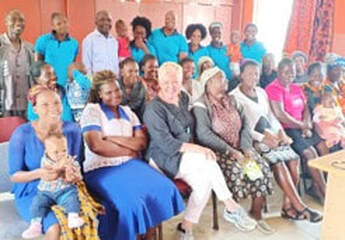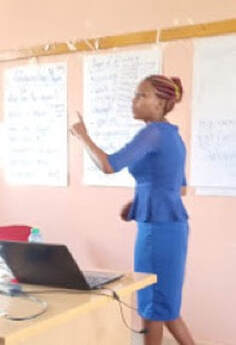HIGHLAND COMMUNITY CHURCH
|
About a decade ago, when I was on the MCC BC Board, an elderly former MCC service worker approached me during an Annual General Meeting gathering. He said, with some indignation, that when he and his wife had been international MCC service workers in the 1960s, there were many more service workers stationed all over the world than there were now, and what was wrong with MCC was that we weren’t sending more workers into the field to “do the job.” This attitude was certainly in keeping with how most international NGOs (non-governmental organizations) used to work. The beginning of MCC’s work in Kenya was in 1962, just when Kenya was about to gain its long-sought independence from British colonial rule. MCC implemented the Teachers Abroad Program (TAP), sending 120 Western university graduates to teach in Kenyan schools. Well-meaning though this was, it was not a partnership model; rather, it was Western teachers delivering a Western model of education to newly liberated Kenyans struggling to rediscover the African culture they had brutally lost over several centuries. The pain and hurt of colonial rule in Kenya still run very deep. Since those days, most worldwide NGOs have transitioned to a much more sensitive and progressive model of bringing relief and development to developing countries, as has MCC. In my recent work as the MCC Kenya Education Coordinator, my task was to come alongside five national education partners and one national maternal health organization which have a carefully formulated vision for bringing relief and development to the poorest of the poor. We invite local partners who share the values and vision of MCC to allow us to work alongside them with donor funds, technical support, reporting assistance, and capacity building. The Coordinator doesn’t deliver programs, but assists our Kenyan colleagues to deliver their own relief, development and peacebuilding programs. For example, the Kenyan government abolished corporal punishment in the schools in 2010. Although this is now entrenched in the Kenyan constitution, we know that “paper to practice” takes a long time, often a generation, or 25 years. Offering strategies for positive classroom management was part of my work. Also, over the last three years, I’ve been focused on developing our partner teachers’ skill set for delivering a more child-centred, competency-based curriculum which the Ministry of Education has introduced. I also assisted our partners in developing and implementing Safeguarding Minors policies. The partners then go on to train their own communities. These local partners have a deep love and care for their own people. They don’t need Westerners to “do the job” for them, but they do need and value our plentiful resources and assistance. It’s been my great honour and pleasure to come alongside our Kenyan partners in bringing more hopeful futures to many Kenyans over the last three years. The two following photos illustrate MCC-assisted work in Kenya:  I facilitated a day long workshop on February 18, 2020, with Maternal Health Care Group Mothers, focused on Safeguarding Minors. This MCC project is located in Mukuru Kwa Ruben Slum, one of the oldest and biggest slums in Nairobi. These eighteen local volunteer leaders take their responsibilities very seriously. The men in the photo are project facilitators. We have two local men and one woman who train eighteen groups of pregnant and lactating women every week in better health care, nutrition, and pre- and post-natal care. They work together as a team. The women appreciate the respectful modelling that our two male facilitators demonstrate in their gender relationships, and sometimes ask their husbands and boyfriends to sit in and listen.  This is Sylvia Odula, an 18-year-old single mother and Maternal Health Care Group volunteer, practising the concepts she learned in the Safeguarding Minors Workshop on February 18, 2020, so that she can then teach her own Care Group of ten pregnant and lactating mothers. In the group photo above, she’s sitting with her baby on the far left. --Meg Gerbrandt-Wiebe About the author: Mary-Esther Gerbrandt-Wiebe, known as Meg, has deep roots in both the Canadian Prairies and the Pacific Northwest. Meg grew up in Southern Manitoba Mennonite communities. After a happy and rewarding public school teaching career in Winnipeg and Abbotsford, she accepted a three-year international assignment with MCC in Kenya, where she focused on supporting education projects and training partners in Child Protection Policies and Safeguarding Minors. Meg has two adult married children living on opposite sides of the continent This article was originally published in Roots and Branches (Journal of the Mennonite Historical Society of BC), May 2020. You can see the issue of Roots and Branches and find out more information about the Mennonite Historical Society of BC at http://www.mhsbc.com/index.php
For more information on the work of MCC (Mennonite Central Committee) you can go to https://mcccanada.ca/ |
 RSS Feed
RSS Feed
7/30/2020